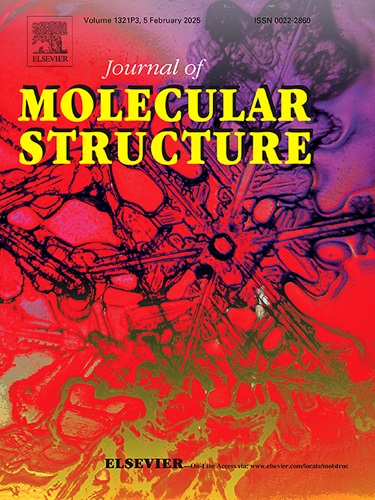A PET based colorimetric/fluorescent dual-signal probe for selective detection of hypochlorite in real water samples
IF 4.7
2区 化学
Q2 CHEMISTRY, PHYSICAL
引用次数: 0
Abstract
As a potent oxidizing agent, hypochlorite is pervasive across various terminal disinfection processes, including water treatment, household blenching and medical sterilization. Thus, the specific visualization identification of hypochlorite in real water samples is crucial for assessing water quality safety and pollutant toxicity. Herein, a novel turn-on colorimetric/fluorescent dual-signal probe AMXM based on 6‑methoxy-2,3-dihydro-1H-xanthene-4-carboxaldehyde scaffold has been successfully designed and synthesized for highly selective and sensitive detection of ClO− in real water sample. Upon the addition of hypochlorite, the solution's color visibly changes from red to yellow to the naked eye, and a strong yellowish green fluorescence is observed under UV light at 365 nm. AMXM demonstrates an excellent linear response (R2 = 0.9922), with a low detection limit of 56.2 nM, and is unaffected by other potential interfering substances. The mechanism of AMXM’s response to hypochlorite ions was confirmed through 1H NMR spectroscopy and density functional theory (DFT) calculations. Furthermore, AMXM was successfully applied to paper test strips and used for the quantitative determination of hypochlorite ions in four real water samples.
基于 PET 的比色/荧光双信号探针,用于选择性检测实际水样中的次氯酸盐
作为一种强效氧化剂,次氯酸盐普遍存在于各种终端消毒过程中,包括水处理、家庭漂白和医疗消毒。因此,对真实水样中的次氯酸盐进行特异性可视化识别对于评估水质安全和污染物毒性至关重要。本文成功设计并合成了一种基于 6-甲氧基-2,3-二氢-1H-呫吨-4-甲醛支架的新型开启式比色/荧光双信号探针 AMXM,用于高选择性、高灵敏度地检测真实水样中的 ClO-。加入次氯酸盐后,肉眼可见溶液的颜色由红色变为黄色,在 365 纳米紫外光下可观察到强烈的黄绿色荧光。AMXM 具有出色的线性响应(R2 = 0.9922),检测限低至 56.2 nM,并且不受其他潜在干扰物质的影响。通过 1H NMR 光谱和密度泛函理论(DFT)计算,证实了 AMXM 对次氯酸盐离子的响应机制。此外,还成功地将 AMXM 应用于纸质试纸,并用于定量测定四种真实水样中的次氯酸盐离子。
本文章由计算机程序翻译,如有差异,请以英文原文为准。
求助全文
约1分钟内获得全文
求助全文
来源期刊

Journal of Molecular Structure
化学-物理化学
CiteScore
7.10
自引率
15.80%
发文量
2384
审稿时长
45 days
期刊介绍:
The Journal of Molecular Structure is dedicated to the publication of full-length articles and review papers, providing important new structural information on all types of chemical species including:
• Stable and unstable molecules in all types of environments (vapour, molecular beam, liquid, solution, liquid crystal, solid state, matrix-isolated, surface-absorbed etc.)
• Chemical intermediates
• Molecules in excited states
• Biological molecules
• Polymers.
The methods used may include any combination of spectroscopic and non-spectroscopic techniques, for example:
• Infrared spectroscopy (mid, far, near)
• Raman spectroscopy and non-linear Raman methods (CARS, etc.)
• Electronic absorption spectroscopy
• Optical rotatory dispersion and circular dichroism
• Fluorescence and phosphorescence techniques
• Electron spectroscopies (PES, XPS), EXAFS, etc.
• Microwave spectroscopy
• Electron diffraction
• NMR and ESR spectroscopies
• Mössbauer spectroscopy
• X-ray crystallography
• Charge Density Analyses
• Computational Studies (supplementing experimental methods)
We encourage publications combining theoretical and experimental approaches. The structural insights gained by the studies should be correlated with the properties, activity and/ or reactivity of the molecule under investigation and the relevance of this molecule and its implications should be discussed.
 求助内容:
求助内容: 应助结果提醒方式:
应助结果提醒方式:


